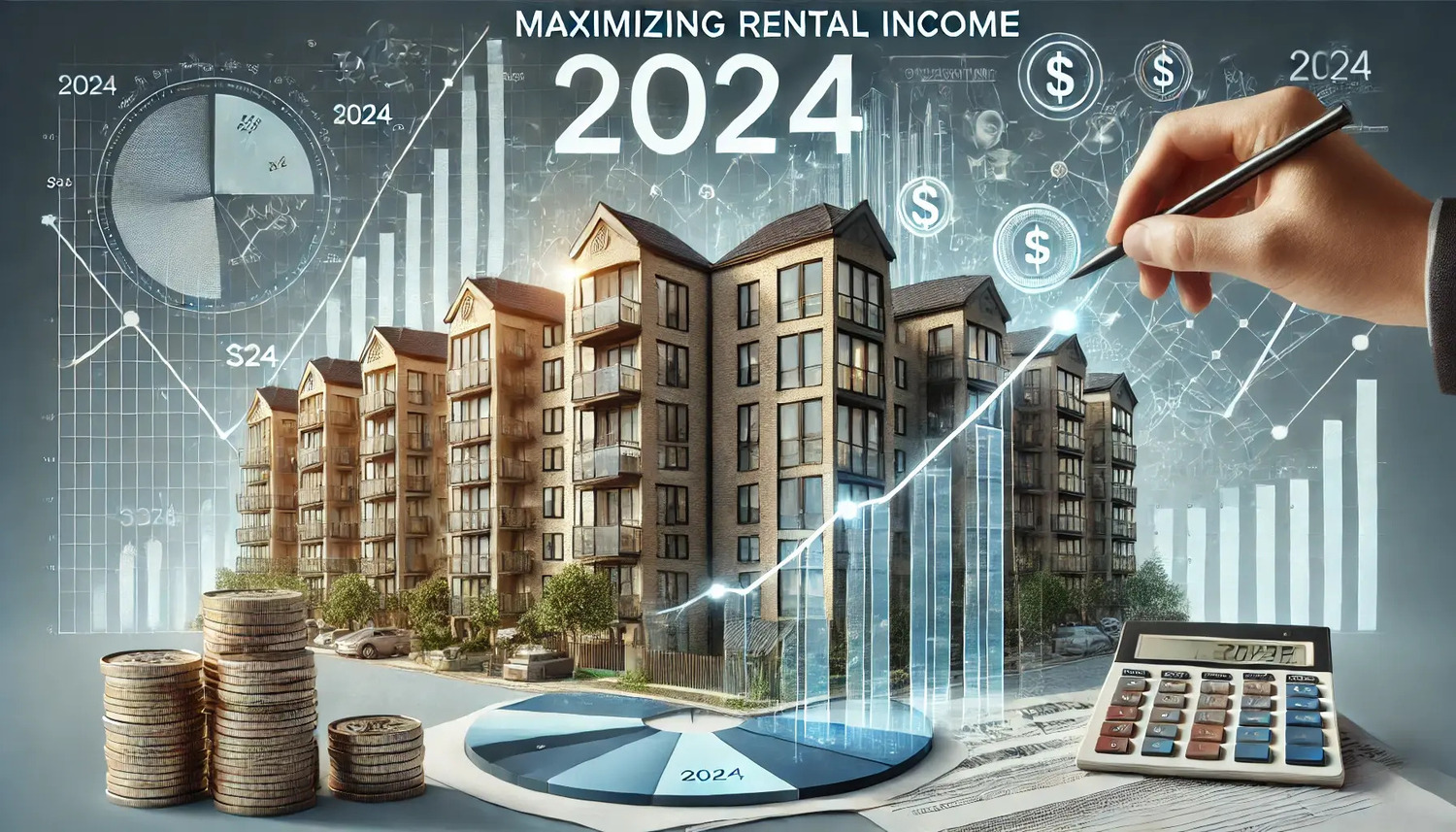Maximizing rental income is a top priority for landlords and property managers, especially in a dynamic market like 2024. As the real estate landscape evolves, strategies must be adapted to ensure your property remains competitive and profitable. This guide will explore the best property management tips for maximizing rental income in the coming year.
Understanding Market Trends in 2024
To effectively maximize rental income, it’s crucial to understand the current market conditions. Various factors, including inflation, interest rates, and housing demand shape the rental market in 2024. Staying informed about these trends allows property managers to make data-driven decisions.
Local market conditions also play a significant role in rental income. Understanding the specific dynamics of your area—such as employment rates, population growth, and local amenities—can help you tailor your rental pricing and strategies to meet demand. For instance, a booming job market might drive higher demand for rental properties, allowing you to increase rents. Conversely, in areas where the population is declining or where there is an oversupply of rental units, you may need to adjust your strategies to stay competitive.
Effective Property Management Strategies
Regular Property Maintenance is the foundation of maximizing rental income. A well-maintained property attracts quality tenants and reduces the likelihood of costly repairs. Implementing a proactive maintenance schedule ensures that minor issues are addressed before they escalate, saving money in the long run.
For example, routine inspections can catch small issues, like leaky faucets or worn-out seals, before they become major problems that require expensive repairs. Additionally, regular maintenance keeps your property in top condition, making it more appealing to prospective tenants who are willing to pay a premium for a well-kept home.
Enhancing your property’s appeal is another vital strategy. This could include improving curb appeal with landscaping, updating interiors with modern finishes, or adding amenities that tenants desire. Even minor upgrades, like fresh paint or updated fixtures, can make a significant difference in rental value.
Consider the potential ROI of each upgrade. For example, updating the kitchen with energy-efficient appliances and modern countertops can command higher rent, while a fresh coat of paint and new flooring can make the entire space feel new and inviting, attracting tenants who are willing to pay more for a stylish and comfortable home.
Long-term tenants provide stable income, and by offering exceptional services—such as timely repairs, clear communication, and occasional upgrades—you can foster loyalty and reduce the risk of vacancies.
Smart Pricing Strategies
Pricing your rental property correctly is essential to maximizing income. Dynamic pricing—adjusting rental rates based on market conditions—can help optimize income. Tools and software that track local market trends enable property managers to set competitive prices that attract tenants while maximizing revenue.
Seasonal adjustments are another pricing strategy. Rental demand often fluctuates with the seasons, so adjusting your rental rates accordingly can ensure you’re charging the maximum possible rent during high-demand periods.
When considering rent increases, it’s important to balance profitability with tenant satisfaction. Rent increases should be gradual and communicated clearly to tenants. Providing justification for the increase, such as property improvements or rising maintenance costs and rising taxes, can help maintain positive tenant relationships.
Ensure that rent increases are reasonable and in line with the market. An abrupt, large increase might drive tenants away, leading to vacancies and lost income. Instead, aim for modest, regular increases that reflect the rising cost of maintaining the property and its amenities, which tenants are more likely to accept.
Not raising the rent can be problematic as well. In markets where there are rent controls and other renter protections, the rent rate can fall behind when the market rent rates are increasing. This can lead to a decrease in property valuation which could affect your plans or property.
Leveraging Technology and Automation
Technology is a powerful tool for property managers. It is becoming expected and necessary. Property management software can automate many tasks, such as rent collection, lease management, and maintenance requests, making the management process more efficient while increasing customer service. These tools often include analytics features that provide insights into your property’s performance, helping you identify areas for improvement.
Automation reduces the time spent on administrative tasks, freeing you to focus on more strategic aspects of property management, like improving tenant relations or planning property upgrades. It also ensures accuracy and consistency in operations, reducing the risk of errors that could affect your income.
Online marketing and advertising are crucial in today’s digital age. To attract high-quality tenants, your property needs to be visible online. Utilizing websites, online rental platforms, and SEO-optimized property listings can help you reach a wider audience. High-quality photos and detailed descriptions are essential to showcasing your property’s best features.
In 2024, an increasing number of renters are finding properties online, making digital marketing a key component of your rental strategy. A strong online presence, complete with quality marketing and responsive communication, can set your property apart from the competition, helping you fill vacancies quickly and at higher rental rates.
Financial Planning and Budgeting
Effective financial management is crucial for maximizing rental income. Expense management is about finding ways to reduce costs without compromising on quality. This could include negotiating better deals with contractors, investing in energy-efficient upgrades to reduce utility costs, or regularly reviewing expenses to identify areas for savings.
For instance, depending on the property, switching to energy-efficient lighting or upgrading insulation can lower utility bills, benefiting both you and your tenants. Additionally, regularly reviewing contracts with service providers, such as landscapers or cleaners, can help you find more cost-effective solutions without sacrificing service quality.
Cash flow management is another key area. Ensuring a steady cash flow allows you to cover expenses, invest in property improvements, and weather any financial downturns. Regularly monitoring your cash flow and adjusting your budget as needed is essential for maintaining financial health.
To improve cash flow, consider setting up automatic rent payments through your property management software, reducing the risk of late or missed payments. Additionally, maintaining an emergency fund for unexpected expenses ensures you’re prepared for any financial surprises, such as major repairs or vacancies.
Investing in property upgrades can also boost rental income. However, it’s important to choose upgrades that offer a good return on investment (ROI). This could include adding energy-efficient appliances, updating the kitchen or bathroom, or improving security features. Before making any investment, calculate the potential increase in rental income against the cost of the upgrade to ensure it’s a financially sound decision. Don’t forget that keeping the property up to date also helps in renting the property more quickly which affects revenue.
Legal and Regulatory Considerations
Staying compliant with local laws and regulations is vital to protecting your rental income. This includes understanding landlord-tenant laws, rent control regulations, and safety standards. Failing to comply with these regulations can result in fines or legal action, which can significantly impact your profitability.
Keep abreast of any changes in local laws, state laws, and federal laws that could affect your property, such as new rent control measures or safety regulations. Regularly review your leases to ensure they comply with current laws, and consider consulting with a legal professional to protect your interests.
A clear and comprehensive lease agreement is your first line of defense in protecting your rental income. Your lease should outline all terms and conditions, including rent amount, payment schedule, and responsibilities for maintenance and repairs. Clearly defined terms help prevent misunderstandings and disputes, ensuring a smooth relationship with tenants.
Additionally, include clauses that protect your income, such as late fees for overdue rent or penalties for breaking the lease early. These provisions can help ensure that your rental income remains stable, even if issues arise. It is prudent to make sure those clauses are legal prior to using them. A little time, effort, and money spent upfront can save a lot of time, effort, and money later.
Conclusion
Maximizing rental income in 2024 requires a combination of understanding market trends, implementing effective property management strategies, and leveraging technology. By staying informed and proactive, property managers can ensure their properties remain profitable in a competitive market.
However, if managing all these aspects feels overwhelming or if you simply don’t have the time or resources, Trio Property Management Inc. is here to help. With over 20 years of experience, we specialize in maximizing rental income for our clients. Contact us today at 541.434.1900 to learn how we can take the burden off your shoulders and help you achieve your rental income goals.
FAQs
Q: How can I determine the right rental price for my property?
A: You can determine the right rental price by analyzing local market trends, using dynamic pricing strategies, and considering factors like property condition and amenities.
Q: What are the most effective upgrades to increase rental income?
A: Focus on upgrades that enhance the property's appeal, such as modernizing the kitchen, adding energy-efficient appliances, and improving curb appeal. Keep in mind what will appeal to the most people possible.
Q: How often should I increase the rent?
A: Rent increases typically occur annually, but the frequency can vary based on market conditions and tenant agreements. Ensure increases comply with local laws.
Q: What is the best way to market my rental property online?
A: Use a combination of quality media, online rental platforms, and a well-designed property website. High-quality photos and detailed descriptions are crucial. Make sure to not violate Fair Housing Laws or any other applicable laws.
Q: How can I reduce tenant turnover?
A: Building strong tenant relationships, addressing maintenance requests promptly, and creating a pleasant living environment are key strategies to reduce turnover.







